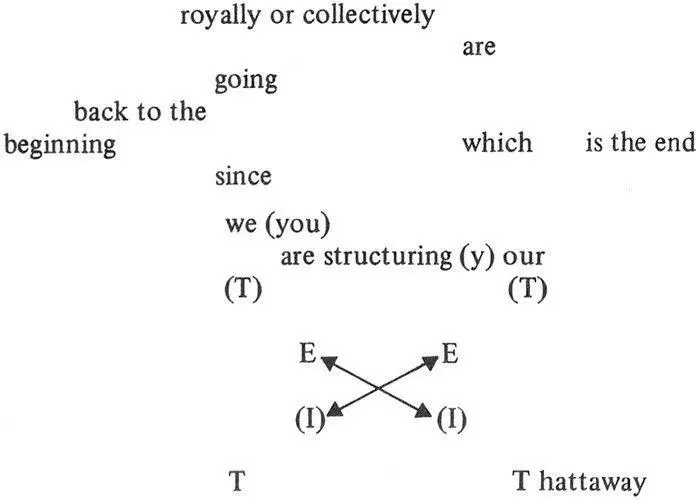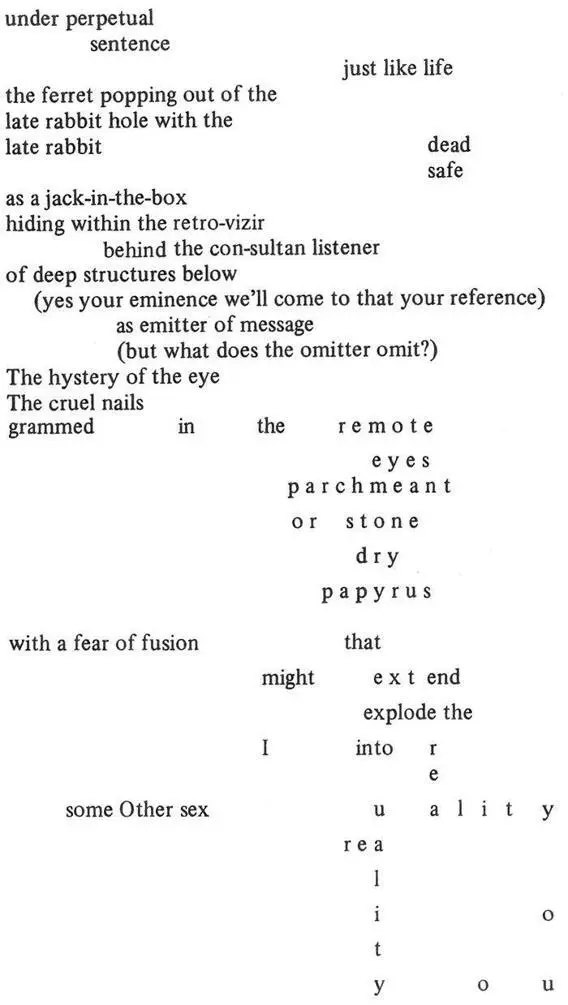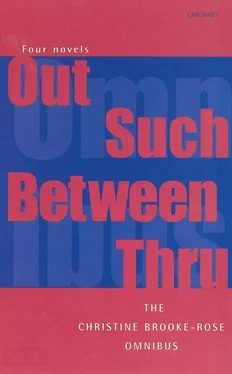Christine Brooke-Rose - The Brooke-Rose Omnibus
Здесь есть возможность читать онлайн «Christine Brooke-Rose - The Brooke-Rose Omnibus» весь текст электронной книги совершенно бесплатно (целиком полную версию без сокращений). В некоторых случаях можно слушать аудио, скачать через торрент в формате fb2 и присутствует краткое содержание. Год выпуска: 2012, ISBN: 2012, Издательство: Carcanet Press Ltd., Жанр: Современная проза, на английском языке. Описание произведения, (предисловие) а так же отзывы посетителей доступны на портале библиотеки ЛибКат.
- Название:The Brooke-Rose Omnibus
- Автор:
- Издательство:Carcanet Press Ltd.
- Жанр:
- Год:2012
- ISBN:9781847775757
- Рейтинг книги:5 / 5. Голосов: 1
-
Избранное:Добавить в избранное
- Отзывы:
-
Ваша оценка:
- 100
- 1
- 2
- 3
- 4
- 5
The Brooke-Rose Omnibus: краткое содержание, описание и аннотация
Предлагаем к чтению аннотацию, описание, краткое содержание или предисловие (зависит от того, что написал сам автор книги «The Brooke-Rose Omnibus»). Если вы не нашли необходимую информацию о книге — напишите в комментариях, мы постараемся отыскать её.
The Brooke-Rose Omnibus — читать онлайн бесплатно полную книгу (весь текст) целиком
Ниже представлен текст книги, разбитый по страницам. Система сохранения места последней прочитанной страницы, позволяет с удобством читать онлайн бесплатно книгу «The Brooke-Rose Omnibus», без необходимости каждый раз заново искать на чём Вы остановились. Поставьте закладку, и сможете в любой момент перейти на страницу, на которой закончили чтение.
Интервал:
Закладка:
The moving finger writes and having writ scrubs out the diagram. Tous les signifiés du portrait sont faux but even altogether cannot succeed in naming the falsehood, although they point to it in a hermeneutic gap chock full of the parenthetic fallacy whereby the falsehood is long desired but evaded by way of the evasive mouth and its paradismal trick of articulation.
It is the pain, it is the pain endures (I may the beaute of it not sosteyn) and pain, which takes a minimal fraction of a second thought to say, has to be lived through, and you could cover pages and maybe you do, rehandling the signifiers into acceptability and even amusement so that at last it vanishes like delight, a pricked balloon, a bubble not a festering boil. For no recipient desires a message of pain emitted from another, neither if he is in it nor if he is out of it, all the less so if has caused it. So you do not transmit the message, many times, and the unmany times you do you regret it since it falls on an earful of sirensong or wax or crabs. Only ebullience can be shared, grabbed, and is, for there is always someone who needs to reinvest in it.
Marco for instance.
Or is it Stavro?
At last we


The moving finger with its dumb designation maintains the truth (of the falsehood) in a pregnant plenitude the piercing of which (with the punishing finger in final position), both liberating and catastrophic, must bring about the end of the discourse, and the character (finger or pistol) is never more than a passage of the enigma with which you dip us all in the eternal debate with the sphinx that has stamped the whole of occidental paradismatics. Therefore the truth (about the falsehood) must be evaded at all cost of life until the death of the discourse.
Or at any rate, it needs adjusting.
Her hair is fair or dark, it doesn’t matter except in gothic romanesque now that there are such subtle dyes even within the text. She is pale and sits
Where?
On the campus
Can one sit on a campus?
She sits on a castle terrace in Spain.
Caramba not picaresque that’s as dead as the dread-letter novel.
In Slovenia, talking to the count
Titles have been abolished in Slovenia
turning her back to you. It is a warm summer evening. The benches and tables are of wood, under a trellis of vine, facing the crenellated walls that hide the view of the valley. Scrub that. The bench and tables are of wrought iron, under the palladian colonnade, facing the flight of white stone steps that lead to the wide gardens wrought-ironed beneath the moon in patterns of clipped privet. By the light of adapted eighteenth-century coach-lamps between each tall french window two foursomes call out one heart, I pass, two diamonds, three clubs, three diamonds, I pass, four diamonds counterpointed by three hearts, four clubs, four hearts I pass. Other groups sit and talk, smoking and sipping wine.
The count is a mad mathematician who makes strange signs on a sheet of paper as she leans half facing him, right breast tensed out by the angle of her arm right hand on her right hip, her thighs crossed tight under a black silk skirt, left elbow on the table the left hand supporting the long curve of jaw with thumb under the chin and the two long forefingers up into her temple hair the other two below her open lips, the two sets of two fingers forming an angle for the deeply interested gaze upon his words and symbols, and at the angle the wedding ring and the sapphire delicately ovaled in diamonds. But you should know Boolean algebra dear lady it would help you considerably look, I simplify, the connectives are not, or, and, if.
You feel so totally out of it that you will spare the other recipient the details since you are only a substitute narrator, jack-in-the-box not jack-of-all-trades, a mere pistol whose only role is to utter by chance or by sudden overwhelming desire the words of love for ever unbelieved. We’ll come to that. The details over his handsome shoulder a little too close to hers look like a rectangle crossed by a diagonal marked with capital letters, followed by another set of letters the last line of which he says is a false premise with a true implication. The false premise being apparently that she has asked him how to represent in two dimensions a three-dimensional graph of narrated time past present and future, coding in as well narrative time for the reader as an unknown variable, the writer’s time being irrelevant since the author does not exist, she says, only the text. And the true implication being perhaps her retrospective realisation that she has worked at something infinitely beyond her and beyond you too, so that you want to break up this communion of false premises with your uncomplicated desire which has been quietly generated for some time out of your request for a lift from her ebullient presence and black Fiat Luxe to Hungary where Marika lives on whom you last put terrific pressure to leave her husband escape to freedom and you and whom you itch to see whether. You’re mad it’s miles out of my way Oh please it would be such fun And then what you dump me in Budapest? Well er no of course So what then will she like seeing you arrive with another woman? Think pig. Why pig? It was a quotation, from Beckett. Who’s Beckett? Two clubs, two hearts, two spades.
Leading metonymically via your desarroi and desire and the hot summer evening to the dutch courage from the slovene wine which enables you to down your shyness and break up the communion of false premises with another in close hot urgency near her perfumed ear when are you going to stop this and pay attention to me I can’t compete I’m not the latin lover type.
She laughs. I’ll deal with you later.
And no doubt she does.
Meanwhile something has gone wrong with the narration owing to textual disturbances. The castle seemed momentarily to be French. And yet you have drunk slovene wine and referred to the count as the latin lover type, the French being Frankished Gauls, despite the fact that you are yourself Italian, obviously with a name like Marco. Unless you are Stavro after all in which case you could be Albanian. Or Russian or maybe Slovenian. The Albanians could have been Etruscans.
Perhaps you had better transfer the whole scene to Mexico.
They don’t have counts in Mexico, or castles.
Or to California which is full of exiles and where they move castles from Europe stone by stone or construct fake follies. So you could move it too, No, better in Europe where the revolution will not occur since
Oh keep that out of it we’re on vacation now not on campus. The students have dispersed and the continuous notation cards on which you compose portraits and double portraits have been cybernetically processed into degrees of absence, permutated through the computer into grades obtained for this or that course the chaotic freedom in the choice of which makes you drive off onto the highway towards the paradiso terrestre. This is an idyll. Who speaks? There is a confusion of voices here, out of narrative time and out of character. The highway moreover is not always high, and in some cities the thruway goes round.
It is the Count who speaks however, pressing her into reading I promessi sposi as the best novel in the world and who is therefore quite evidently Italian, even if he is not a count.
But why a castle? It cannot be merely to change the scene since motivation is a cost and V = F. It could be a hotel (for realism). It could be for alliteration: a castle in California? in Catalunia? Calabria? Caledonia Canada Karinthia Kamchatka. But the punishment in final position has occurred on the diasporic term: the castle must be in France (Cantal or Aquitaine). Cancel however the calls of bridge. It is a Congress in Semiotics and semioticians do not play bridge but at semic polarities.
Читать дальшеИнтервал:
Закладка:
Похожие книги на «The Brooke-Rose Omnibus»
Представляем Вашему вниманию похожие книги на «The Brooke-Rose Omnibus» списком для выбора. Мы отобрали схожую по названию и смыслу литературу в надежде предоставить читателям больше вариантов отыскать новые, интересные, ещё непрочитанные произведения.
Обсуждение, отзывы о книге «The Brooke-Rose Omnibus» и просто собственные мнения читателей. Оставьте ваши комментарии, напишите, что Вы думаете о произведении, его смысле или главных героях. Укажите что конкретно понравилось, а что нет, и почему Вы так считаете.












